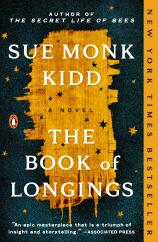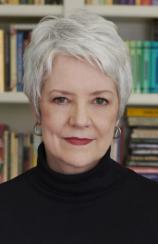The Book of Longings
Review
The Book of Longings
“I am Ana. I was the wife of Jesus of Nazareth,” reads the opening lines of Sue Monk Kidd’s ambitious fourth novel. It’s an unexpected and intriguing beginning, making it clear from the jump that we are in for a story that involves a very different kind of savior than the one you might have met in Sunday school. Kidd --- who has written extensively about her own journey from traditional Christianity to a more feminine spirituality --- boldly challenges what we think we know about the life of the Messiah and early Christianity by imagining that the man at the center of the faith had a wife, a young woman named Ana. THE BOOK OF LONGINGS is her story.
In this deft, moving book, Kidd introduces Ana as a restless 14-year-old whose greatest desire is to be the “chronicler of lost stories” --- the one who preserves the tales “of the matriarchs in the Scriptures,” who, she observes, have been overlooked in favor of men. The privileged daughter of Herod Antipas’s head scribe, Ana has been taught to read and write, a rarity for a woman in her time. But her life of relative freedom is coming to an end. Ana’s parents have betrothed her to an old, repulsive man named Nathaniel ben Hananiah. She must hide her ink and papyrus and submit to her fate.
On her way with her parents to her first meeting with Nathaniel, Ana encounters Jesus, then a simple peasant and stonemason, in the market. Though they do not speak, the connection is immediate, more sexual than spiritual. When his gaze falls upon her, she senses “the heat of it touching my shoulders, my neck, my cheeks. I should’ve looked away, but I could not.” After she falls and he helps her up, she feels “an odd smelting in my thighs.”
"What [Ana] wants most of all is a voice, to be recognized for who she is and to be heard by those around her. Kidd gives her that voice in this emotionally resonant tale."
Nathaniel’s sudden death spares Ana the horror of an unwanted marriage. But having already been promised to him, she’s essentially a widow. Then Antipas announces that he wants her for his concubine, an indignity to which she is unwilling to submit. Her refusal nearly gets her stoned to death, but Jesus --- who Ana has met again by chance, walking outside the city --- intervenes, saving her life by promising to marry her.
Kidd’s feminist take on the lost years of Jesus’s life will delight many readers, even as it has the potential to make others uncomfortable. Her imagined Jesus is a deeply human figure. He is kind, funny and loving, and a devoted, sometimes flawed, husband. But we also see his empathy for outcasts, his desire for a better world, and the way he “put[s] compassion above holiness,” believing, as he tells Ana during one of their first conversations, that “God cannot be contained.” Their relationship is one of respect and mutual understanding. Both have a sense that they are meant for a greater, though as yet unclear, purpose.
Ana’s journey from a spirited and pampered young woman to the wife of a peasant is rendered in rich detail. Impetuous and at times self-centered, she struggles to adjust to a more modest life where she is expected to bake bread and tend goats. Gradually, her dreams of writing fade. But her creative and rebellious spirit is reawakened after a personal tragedy. “I tried for so long to belong, to be as they needed me to be,” she tells her husband. “Now I wish to be myself.”
As the years pass, the political situation in Galilee grows increasingly tense, with the Jewish population chafing under Roman rule. Jesus becomes intrigued by a radical figure known as John the Immerser, leaving his family to follow him for months. And he becomes close with Ana’s brother Judas, a zealot bent on fomenting rebellion against Antipas. “I had the sense of something awful coalescing around me,” Ana thinks, not yet knowing how irrevocably their lives are about to change.
But this is Ana’s story, not Jesus’s. Just as we get to the moment when Jesus prepares to take up the mantle of the Messiah, the setting of THE BOOK OF LONGINGS shifts to Egypt. Ana has again earned the ire of Antipas, forcing her to leave her husband and flee Galilee with her aunt Yaltha, who is searching for her long-lost daughter. Eventually, the two take up residence in a monastic community on the outskirts of Alexandria. Here, Ana finally finds the time to write her stories, and she composes several volumes telling tales not only of Biblical women but also of the women she knows, including her aunt, whose child was taken from her by an abusive husband; her friend Tabitha, whose tongue was cut out after she accused a man of rape; and a lamentation for her and Jesus’s stillborn daughter Susanna. After years of separation, Ana manages to return to Jerusalem just before Jesus’s crucifixion, and we see the horror of that event through her eyes.
“To be ignored, to be forgotten, this was the worst sadness of all,” Ana says early in the novel. What she wants most of all is a voice, to be recognized for who she is and to be heard by those around her. Kidd gives her that voice in this emotionally resonant tale. If a woman like Ana did indeed exist (and in her afterword, Kidd makes a case that she could have), then she truly has been silenced for millennia. But perhaps, as Kidd imagines, there is a secret stash of scrolls hidden somewhere in the desert, and on them is a great story waiting to be heard.
Reviewed by Megan Elliott on April 24, 2020
The Book of Longings
- Publication Date: March 23, 2021
- Genres: Fiction, Women's Fiction
- Paperback: 448 pages
- Publisher: Penguin Books
- ISBN-10: 0143111396
- ISBN-13: 9780143111399




